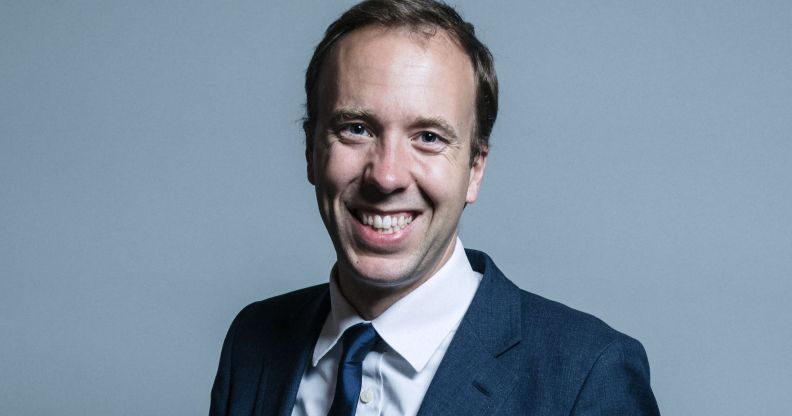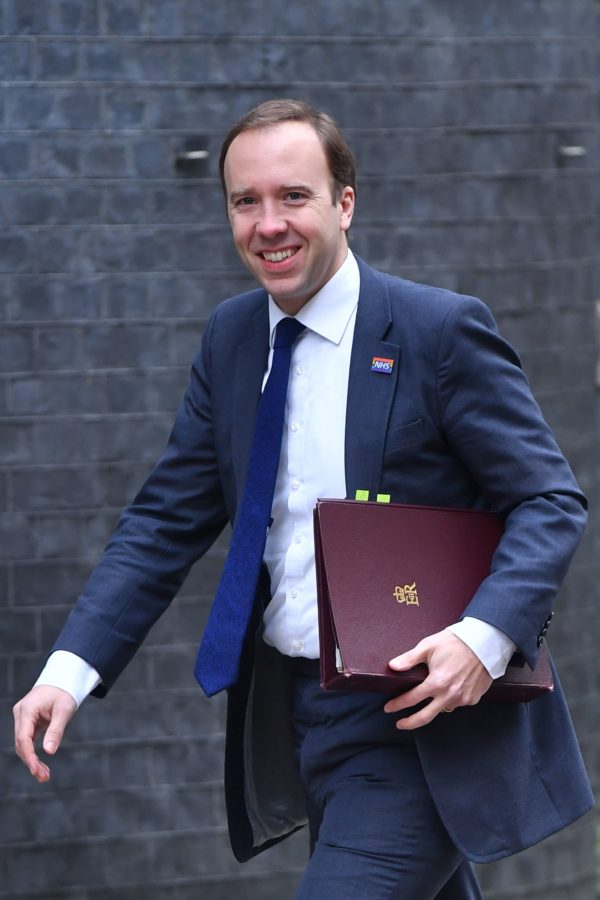Health secretary tells Brits ‘don’t stockpile medicine’ amid Brexit shortage fears

Health secretary Matt Hancock. (UK Parliament)
Health Secretary Matt Hancock has urged the public not to stockpile medication amid fears of shortages in the event of a no-deal Brexit.
The politician told PinkNews on Friday (February 1) his Department of Health and Social Care is doing all it can to ensure that there are enough drugs for NHS patients should Britain exit the European Union as planned in March.
“The point is that people, individuals don’t need to stockpile, hospitals don’t need to stockpile, pharmacies don’t need to stockpile—the pharmaceutical companies are doing the stockpiling and they will fulfil their contracts in the normal way,” said Hancock.
“We’re doing everything that we can to make sure that there’s an unhindered flow of medicines in any scenario,” the health secretary continued. “If everyone does what they need to do, then I’m confident that will happen, but there’s a lot of work going on now.”
“The pharmaceutical industry are responsible for delivering the drugs that people need post-Brexit exactly as they are now.
“They are doing a huge amount of work to ensure that there’s adequate stockpiles in case of a disruption at the border.
“And we are prioritising medicines should there be a disruption at the border. But there is a lot of work needed to be done.”
The Tory MP for West Suffolk, however, admitted that there are a “small” number of drugs that have yet to be accounted for in order to ensure there are no supply shortages.
Pharmaceutical companies are stockpiling drugs in preparation for Brexit, says health secretary Matt Hancock
The health secretary’s comments come amid fears that hospitals could run out of vital medicines and supplies if there is a no-deal Brexit.
But Hancock said that the “work we’ve done so far shows that we already have a plan in place for the vast majority of the 12,000 medicines that are used in the UK,” adding: “We will have a plan in place for all of them by exit day.”
“Individuals don’t need to stockpile, hospitals don’t need to stockpile, pharmacies don’t need to stockpile—the pharmaceutical companies are doing the stockpiling and they will fulfil their contracts in the normal way.”
—Health secretary Matt Hancock
“The number where there isn’t a plan in place is small enough that we are handling each one of those individually,” he said.
Hancock insisted that the matter is “very much not out of my hands, we’re working on it daily as a department.”
Within the LGBT+ community, activists have voiced concern that access to medicines for treating HIV and hormone replacement therapy (HRT) could be restricted if Britain leaves the EU without a deal.
Asked whether he could guarantee there would be no shortage of medicines for HIV treatment and HRT, Hancock was less certain. He said he would look into supplies of these drugs.
Health secretary Matt Hancock reveals plans to double PrEP trial to reach 26,000 people
Hancock went on to discuss his plans to double the NHS’ trial for HIV prevention drug PrEP so that it is available to 26,000 people.
The MP revealed his plans to expand to increase availability of the drug, which is currently halfway through a three-year trial, in a speech at the Global AIDS Forum in London on Wednesday (January 30).
It is part of the government’s pledge to eradicate new HIV transmissions in England by 2030.

Matt Hancock leaving Number 10 Downing Street. (BEN STANSALL/AFP/Getty Images)
“The PrEP trial is halfway through a three-year trial but there’s already evidence of greater need than the existing 13,000 number,” Hancock explained.
“It has to continue to be a trial, so that we get the full evidence of the value and importance of PrEP.
“But I know that there’s many people now who want to have access who don’t. As part of our goal of eradicating new infections by 2030, we need to get moving.”
Hancock also addressed concerns that sexually transmitted infections like syphilis and gonorrhoea are on the rise in the UK, following funding cuts and reduced opening hours at sexual health clinics.
“The number of attendees to sexual health services has gone up every year over the last two years and the overall number of STIs has come down,” he said.
“But, within that overall number, there’s clearly some areas of concern.
“So we’ve got a renewed focus on the prevention of ill health across the board, and clearly this includes STIs.”
Hancock added: “We are assessing how it’s best to commission these services because they’re often delivered by the NHS but commissioned through local authorities.”

